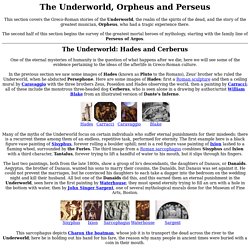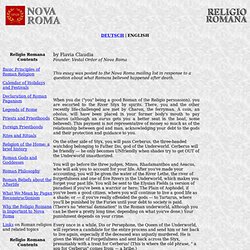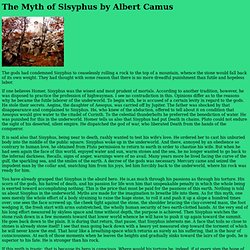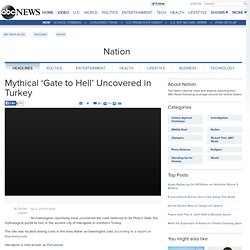

Greek and Roman Perceptions of the Underworld (PDF on Drive) The Underworld, Orpheus and Perseus. This section covers the Greco-Roman stories of the Underworld, the realm of the spirits of the dead, and the story of the greatest musician, Orpheus, who had a tragic experience there.

The second half of this section begins the survey of the greatest mortal heroes of mythology, starting with the family line of Perseus of Argos. The Underworld: Hades and Cerberus One of the eternal mysteries of humanity is the question of what happens after we die; here we will see some of the evidence pertaining to the ideas of the afterlife in Greco-Roman culture. In the previous section we saw some images of Hades (known as Pluto to the Romans), Zeus' brother who ruled the Underworld, when he abducted Persephone.
Many of the myths of the Underworld focus on certain individuals who suffer eternal punishments for their misdeeds; there is a recurrent theme among them of an endless, repetitive task, performed for eternity. Michelangelo's "Last Judgement" in the Sistine Chapel Orpheus. Underworld Gods of Greek Mythology THEOI.COM. KET - Greek/Roman Mythology. Roman Beliefs about the Afterlife. By Flavia Claudia Founder, Vestal Order of Nova Roma This essay was posted to the Nova Roma mailing list in response to a question about what Romans believed happened after death.

When you die ("you" being a good Roman of the Religio persuasion), you are escorted to the River Styx by spirits. There, you and the other recently life-challenged are met by Charon, the ferryman. A coin, an obolus, will have been placed in your former body's mouth to pay Charon (although an aurus gets you a better seat in the boat, some believed). This payment is not representative of money so much as of the relationship between god and man, acknowledging your debt to the gods and their protection and guidance to you. Golden Bough from Roman mythology ‘found in Italy’ « E-Learning. They believe the enclosure protected a huge Cypress or oak tree which was sacred to the Latins, a powerful tribe which ruled the region before the rise of the Roman Empire.

In a second, more historically credible legend, the Latins believed it symbolised the power of their priest-king. Anyone who broke off a branch, even a fugitive slave, could then challenge the king in a fight to the death. If the king was killed in the battle, the challenger assumed his position as the tribe’s leader.
The discovery was made near the town of Nemi by a team led by Filippo Coarelli, a recently retired professor of archaeology at Perugia University. The Myth of Sisyphus. The gods had condemned Sisyphus to ceaselessly rolling a rock to the top of a mountain, whence the stone would fall back of its own weight.

They had thought with some reason that there is no more dreadful punishment than futile and hopeless labor. If one believes Homer, Sisyphus was the wisest and most prudent of mortals. According to another tradition, however, he was disposed to practice the profession of highwayman. I see no contradiction in this. Opinions differ as to the reasons why he became the futile laborer of the underworld. It is said also that Sisyphus, being near to death, rashly wanted to test his wife's love. You have already grasped that Sisyphus is the aburd hero. If this myth is tragic, that is because its hero is conscious. If the descent is thus sometimes performed in sorrow, it can also take place in joy.
One does not discover the absurd without attempting to write a manual of happiness. All Sisyphus' silent joy is contained therein. Mythical ‘Gate to Hell’ Uncovered in Turkey. Apr 4, 2013 10:29am Archaeologists reportedly have uncovered the cave believed to be Pluto’s Gate, the mythological portal to hell, in the ancient city of Hierapolis in southern Turkey.

The site was located among ruins in the area, Italian archaeologists said, according to a report on Discovery.com. Hierapolis is now known as Pamukkale. Go to Hell: 11 Ways to Enter the Underworld. The Thinker from Rodin's "The Gates of Hell" (via Jean-Pierre Dalbéra) Hades.

Naraka. Guinee. Xibalba. Though names may differ from one set of teachings to another, almost every religion on the planet features the concept of an underworld – a place to which the souls of the dead are banished, for penance or punishment. Roman Underworld.